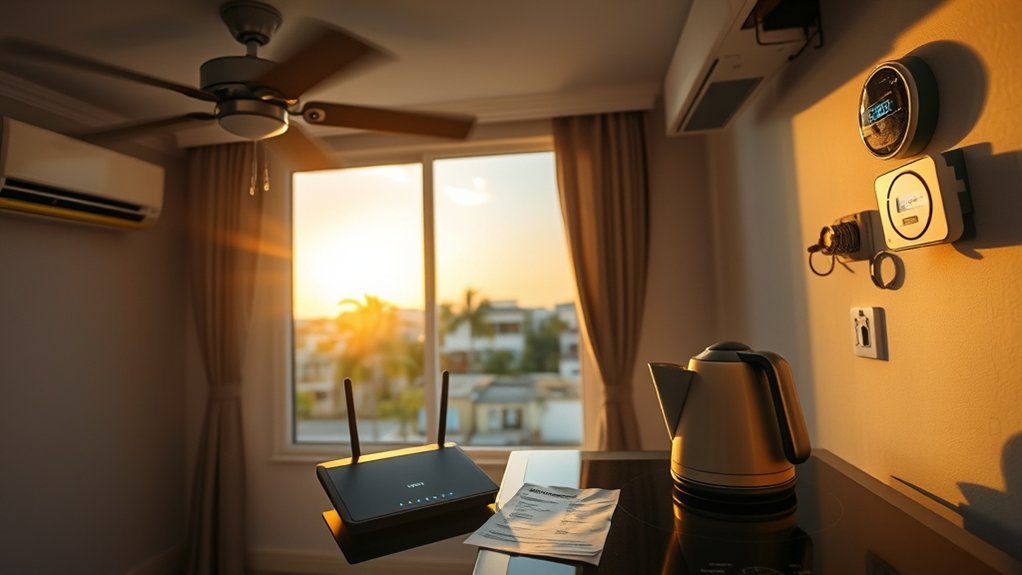You can live modestly in Saint Kitts and Nevis for about EC$3,335 (~US$1,240) a month, while a family of four typically needs EC$8,659–EC$10,500 (~US$3,200–$3,900) depending on housing, schooling, and lifestyle. Expect one‑bedroom rent around US$513–$628, utilities near US$62–$95, and groceries and dining that vary by local versus imported choices. Transport, health insurance, and schooling can raise costs, and the next section breaks down those specifics so you’ll know what to plan for.
Living Costs Overview and Monthly Budget Estimates

Although island life can feel pricey in some areas, you can plan a realistic monthly budget: expect EC$8,659–EC$10,500 (about $3,200–$3,900) for a family of four and roughly EC$3,335 (~$1,240) if you’re single.
Plan a realistic monthly budget: about EC$8,659–10,500 for a family, or EC$3,335 if single.
Use these estimated monthly costs to map your Living Costs and prioritize spending. Utilities for an 85 m² apartment run about EC$95, significantly below U.S. averages, so factor lower bills into your calculations.
Groceries vary: local produce will cut costs, while imported items raise them — chicken breast is around EC$8.77/kg. Dining out is moderate; a neighborhood pub dinner for two is about EC$80.
If you’re single, daily expenses tend to be more flexible; families should expect higher food and transport outlays. Track recurring charges, set aside an emergency buffer, and compare imported vs. local options to control costs.
With deliberate choices, you’ll align your expenses to those estimated monthly costs without surprises.
Housing and Rental Prices by Area

When you compare neighborhoods, expect city-center one-bedrooms around $628 and outside-center units near $513, with three-bedrooms in town about $744.
Don’t forget to add roughly $62 a month for utilities when budgeting.
You’ll also want to weigh local buying costs against renting, since overall rents are typically lower than in major US and UK cities.
Rental Rates by Neighborhood
If you’re comparing neighborhoods in Saint Kitts and Nevis, expect rents to shift noticeably with location and amenities.
You’ll find average rental rates for a one-bedroom in the city center near $628 monthly, while a similar unit outside the center drops to about $513.
For families, a three-bedroom in the city center typically runs around $744 per month.
Neighborhood desirability — proximity to services, views, and security — drives these differences, so you’ll pay more where demand is higher.
Overall housing costs remain moderate compared with many Caribbean islands, making the market appealing to expats and locals.
When choosing an area, weigh the extra rent against convenience and lifestyle you want.
Buying vs. Renting
Wondering whether to buy or rent in Saint Kitts and Nevis? You’ll find renting is often the practical choice: one-bedroom city-center rentals run about $628 (cheaper options near $513), while three-bedrooms average $744 — affordable compared with the USA and UK.
Monthly utilities of roughly $61.90 keep living expenses low, so short-term moves or testing the islands favor renting.
Buying involves real estate hurdles: non-nationals need an Alien Landholding License or to invest via the Citizenship by Investment program, with minimums starting around $325,000.
If you plan long-term, want property equity, and can meet licensing or investment costs, buying can make sense.
Compare your budget, timeline, and tolerance for paperwork when weighing buying vs. renting.
Grocery, Dining Out, and Everyday Expenses

You’ll notice grocery prices vary widely depending on whether you buy imported items or shop local markets—expect milk around $2.99 per liter and chicken near $8.77/kg, while fresh produce is cheaper at local stalls.
Eating out is moderate overall, with lunches about $14.90, fast-food near $12.60, and a dinner for two around $42.30, plus casual local meals for roughly $22 and a cappuccino about $4.35.
Balancing market shopping with occasional restaurant meals is the easiest way to control your day-to-day costs.
Grocery Price Differences
Expect to pay noticeably more for groceries in Saint Kitts and Nevis because most items are imported, though locally produced goods come in cheaper when you can find them.
You’ll notice grocery costs in Saint Kitts rise because imported goods carry shipping and markup; basics like milk run about $2.99 per liter and a 0.5 kg loaf of bread is roughly $3.20.
That said, local products — fresh fruit, vegetables, and some fish — can lower your weekly bill if you shop markets and buy seasonally.
Plan for higher unit prices on packaged and branded items, and reduce costs by choosing local produce and bulk staples.
Everyday bills like utilities and internet add to monthly expenses, so budget accordingly.
Eating Out Costs
Because most food is imported, eating on Saint Kitts and Nevis will stretch your budget faster than in many places, so plan meals accordingly: You’ll notice eating out costs are higher than you might expect. A lunch menu runs about $14.90; dinner for two is around $42.30. Fast food averages $12.60. Grocery prices reflect imports — milk $2.99/L, chicken breast $8.77/kg — so balance cooking and dining out.
| Item | Typical Price | Notes |
|---|---|---|
| Lunch menu | $14.90 | casual restaurants |
| Dinner for two | $42.30 | mid-range |
| Fast food | $12.60 | value option |
Everyday expenses add up, so watch dining out in Saint Kitts and Nevis and compare grocery prices before buying.
Utilities, Internet, and Communication Costs

One clear advantage of living in Saint Kitts and Nevis is that utilities and connectivity tend to be cheaper than in many Western countries: basic utilities for an 85-square-meter apartment run about $95 monthly, well below the U.S. average.
If you’re single, expect utility bills nearer $61.90 per month. Internet is affordable too — a plan with 50 Mbps or higher costs roughly $56, giving reliable home connectivity without a high bill.
For mobile needs, a 30-day prepaid plan with 10GB costs about $35, which is convenient if you prefer pay-as-you-go. These rates make it easy to budget for essentials when living in Saint Kitts, especially compared with many Western cities.
While local transport fares exist, they’re covered elsewhere; here you get lower utility and communication costs that reduce your monthly overhead and let you allocate spending to housing, groceries, or leisure with more flexibility.
Transportation: Cars, Public Transit and Ferries

Transportation in Saint Kitts and Nevis is affordable and flexible, whether you stick to public transit, grab a taxi, rent a car, or hop the frequent inter-island ferries. You’ll find local transport tickets cost about $2.23 each, or $42.20 for a monthly pass, so public transit stays budget-friendly for daily commuting. Taxis aren’t metered; an 8 km ride runs roughly $37, so negotiate fares upfront. If you prefer driving, gasoline is about $0.89 per liter and car ownership can add up; rentals give flexibility at $40–$80 per day.
| Option | Typical Cost | Notes |
|---|---|---|
| Public transit | $2.23 per ride / $42.20 monthly | Cheapest for residents |
| Taxi | ~$37 (8 km) | Negotiate fare in advance |
| Ferry services | $10–$15 | 45-minute inter-island crossings |
Choose based on frequency, cost, and convenience — ferries link islands quickly, while rentals suit short stays or remote travel.
Healthcare, Insurance and Medical Expenses

After you’ve figured out how you’ll get around the islands, you’ll want to understand healthcare and costs. Basic healthcare is free for legal residents, so routine public services won’t usually hit your wallet.
That said, expats are advised to get private medical coverage: private clinics offer faster service and broader options. A short visit to a private doctor runs about EC$90 (≈ USD$33), and a box of antibiotics (12 doses) is roughly the same.
Private health insurance typically costs between $200 and $400 monthly, depending on your age, preexisting conditions and plan limits. If you prefer quicker appointments, specialist access or evacuation coverage, factor that premium into your budget.
Compare plans closely for inpatient limits, prescription benefits and emergency transport. Even with public access, having private insurance gives you more choice and financial predictability for unexpected medical expenses while living in Saint Kitts and Nevis.
Education, Childcare and Higher Learning Costs

While public schooling is free and compulsory for children aged 5 to 16, many expat families choose private or international schools for different curricula and smaller class sizes. Therefore, you should budget for tuition when planning a move.
Private fees vary widely by school, so research local and regional international schools early to compare costs, admission requirements, and extracurricular offerings.
Childcare options are more limited than in larger countries; expect to pay a premium for reliable daycare or after-school care. Consider live-in help if you need flexible hours.
For higher learning, institutions like Ross University School of Veterinary Medicine offer specialized programs, though you’ll want to confirm tuition, living costs, and accreditation specifics for your field.
The government supports education through programs that strengthen public schools and workforce training, which can reduce some expenses.
Taxes, Banking and Property Investment Considerations

Because Saint Kitts and Nevis doesn’t levy personal income, capital gains, or inheritance taxes, you’ll find the tax environment unusually favorable for residents and investors. However, you should still plan carefully around property taxes, banking rules, and any citizenship-by-investment commitments.
With taxes in Saint Kitts limited to property levies, expect rates from about 0.2% to 5% of assessed value depending on location and property type. If you’re a foreign buyer, you’ll either use an Alien Landholding License or consider property investment through the Citizenship by Investment route; minimum real estate investment for CBI starts at USD 325,000, while a direct contribution option requires at least USD 150,000 to the Sustainable Growth Fund for expedited processing.
The banking system is regulated and offers standard services, but you should meet with local banks to discuss mortgage availability, account requirements, and transfer rules.
Work with a local lawyer and financial adviser to confirm tax obligations, title issues, and CBI timelines before you commit to any purchase.
Cost-Saving Tips and Budgeting Strategies for Expats

If you’re looking to stretch your budget in Saint Kitts and Nevis, focus on local habits that cut recurring costs: buy produce at farmers’ markets instead of imported groceries, live outside prime tourist zones where rent and utilities are lower, and use the local bus system (about $2.22 a ride) rather than owning a car, which brings high import taxes and fuel bills.
You’ll keep living expenses predictable by targeting a monthly budget of $1,500–$2,000, while factoring in fluctuating Kitts and Nevis: costs for imported items and private healthcare. Build community ties for low-cost entertainment and practical help.
- Feel the relief of smaller grocery bills when you shop local
- Enjoy calmer neighborhoods with affordable rent and more space
- Save stress and money by using reliable public buses
- Join festivals and meet neighbors without costly outings
- Sleep easier knowing your budget covers essentials and occasional surprises
These Cost of Living strategies make expat life manageable and emotionally rewarding.
Frequently Asked Questions
Is Saint Kitts Expensive to Live?
It’s somewhat expensive compared to global averages; you’ll pay about $1,336 monthly on average. You’ll find affordable meals and utilities, but rent and overall living costs for singles or families can be noticeably higher.
Can a US Citizen Live in St Kitts?
Absolutely — you can live in St. Kitts: you’ll need residency or pursue Citizenship by Investment, meeting financial or property requirements, and prepare for higher import-driven costs, seasonal hurricane risks, and adapting to local services.
How Much Does It Cost to Become a Citizen of St Kitts and Nevis?
You’ll pay a minimum of USD 150,000 to the Sustainable Growth Fund or invest USD 325,000 in approved real estate, plus varying government, due diligence, and processing fees depending on dependents, with citizenship often granted within six months.
What Is the Average Salary in St Kitts?
The average after-tax salary in Saint Kitts is about $1,108 per month. You’ll find wages vary by industry—tourism and finance often pay more—so your actual income can be higher or lower depending on role and experience.
Conclusion
Settling in Saint Kitts and Nevis can feel sunny and simple when you plan smartly. By comparing costs, choosing coastal convenience or quieter countryside, and cutting needless comforts, you’ll control monthly outlays and cultivate calmer cash flow. Prioritize prudent property purchases, reliable healthcare coverage, and local shopping to trim tariffs. With careful budgeting, community connections, and a few cost-cutting conveniences, you’ll enjoy island life without financial friction.


